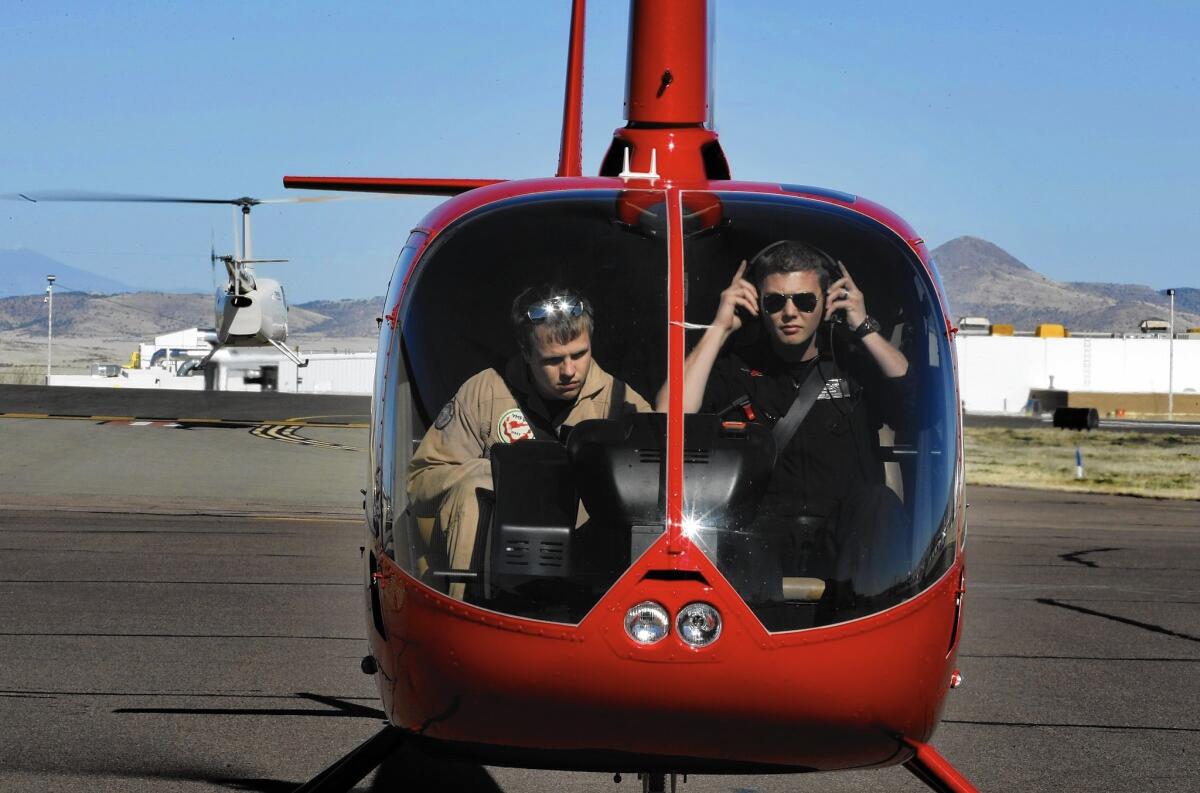U.S. government halts veterans’ enrollment at five more helicopter schools

- Share via
The government has ordered at least five additional helicopter training programs to stop enrolling more veterans, part of a continuing crackdown to end GI Bill abuses that have cost taxpayers tens of millions of dollars.
The latest restrictions have been imposed on programs in Arizona, Florida, Texas and Washington that have trained dozens of veterans at a cost of up to $150,000 each for two years — all billed to the government.
The action followed a halt on new enrollments at Southern Utah University in Cedar City and Yavapai College in Prescott, Ariz., two of the most popular and expensive programs, which routinely charged more than $250,000 for a two-year course.
The U.S. Department of Veterans Affairs began clamping down in March after the Los Angeles Times reported that helicopter flight companies were exploiting a loophole in the newest GI Bill to train veterans entirely at government expense, with no cap on what they could charge.
The programs were cited for violating a requirement that nonveterans make up at least 15% of students in VA-funded programs, a rule aimed at ensuring that programs don’t exist solely on GI Bill money. The VA hadn’t been enforcing the rule.
The crackdown is expected to significantly reduce helicopter flight training for veterans. Even the least expensive programs have found it difficult to attract other students.
At Big Bend Community College in Moses Lake, Wash., where tuition and helicopter flight fees run just under $82,000 for two years, 11 of the 12 students were veterans.
“We didn’t start the program for veterans,” said Doug Sly, a spokesman. “But consciously or subconsciously, you knew those would be the only people with the resources to get in.”
He said the college is appealing the VA suspension.
The VA is allowing veterans already enrolled in the programs to complete their training. At least one school, Palm Beach State College in Florida, has said it plans to shut down its program when current students finish.
Of 115 helicopter students there, 109 were veterans, VA auditors found. “They’re kind of stuck as pawns in the middle of this,” said Thomas Vo, Palm Beach State’s director of financial aid.
Even veterans who complete their training face a difficult future.
Helicopter students generally earn their pilot credentials with 200 to 300 hours in the air, then go to work as flight instructors to reach at least 1,000 hours — the minimum that most employers and their insurance companies require.
But that model only works if there are enough new students to train.
“Unless something changes in terms of student load, we won’t be able to hire,” said Dan Crowe, the owner of Palm Beach Helicopters, which is contracted by Palm Beach State.
Benjamin Samples, a 35-year-old Army veteran who moved to Florida from Seattle and is about halfway through his training there, said he is not giving up.
“If it’s something you love, you trudge on,” he said. “That’s what’s holding me on at present.”
Under the Post-9/11 GI Bill, which took effect in 2009, veterans who served on active duty for at least three years after September 2001 are eligible for 36 months of full tuition at public colleges and universities.
Payments to proprietary flight schools are capped at $11,563 a year. But by working as contractors for public institutions, the companies have been able to avoid that cap.
The programs at Yavapai and Southern Utah often trained veterans in expensive helicopters rather than the basic two- and four-seat models that other students used.
Southern Utah, where training for a single veteran could top $500,000, was the biggest offender. Even now, many veterans fly a turbine-powered Eurocopter Astar for $1,800 an hour — six times the price of training in the cheapest model.
A VA spokesman said the agency has no control over which helicopters veterans train on.
Cindy Barnes, a spokeswoman for Chandler-Gilbert Community College near Phoenix, where helicopter training costs about $110,000 for two years, said economical programs were paying the price for abuses by costlier ones.
The VA found that all 25 helicopter students there were veterans. Several nonveterans have since enrolled, and the college is hoping the VA will soon lift its suspension, Barnes said.
“We feel like they’re punishing the good guys along with the bad,” she said.
Legislation introduced in Congress this year would close the loophole by capping yearly tuition and fees at $20,235, the limit placed on all private colleges and universities. Current students would be exempt from the cap for two years.
The bill has been approved by the House Committee on Veterans Affairs and could reach the House floor for a vote this summer.
Flight programs say the cap is unreasonably low and would essentially end flight training for veterans. The Helicopter Assn. International, an industry group, has been lobbying against the legislation.
“The average veteran can not afford nor get a loan to make up that difference of the dramatic reduction in funding,” Matt Zuccaro, a Vietnam veteran who leads the group, said this month.
An online petition against the bill has attracted more than 7,000 signatures.
“I served my country in order to obtain the Post-9/11 GI Bill benefits of flight school,” one signer wrote. “It would be a huge letdown, and seriously wrong to have served over 5 years only to have this opportunity stripped from me.”
Twitter: @AlanZarembo
More to Read
Sign up for Essential California
The most important California stories and recommendations in your inbox every morning.
You may occasionally receive promotional content from the Los Angeles Times.














